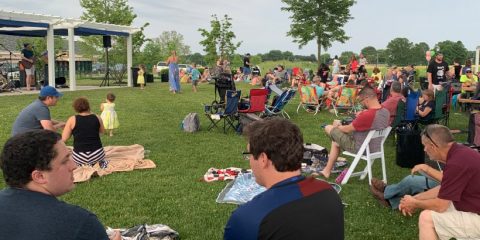Should We Stop Building Libraries?

Well, I owe Ben Franklin an apology. In 1731, he created the American concept of selling membership “shares” to a library. Libraries as homes for collections were not unique, but gathering people and finances was unique. Funds were used to buy books and members were able to share the collection. As we fast forward in time, I admit that I entertained the naive notion that libraries serve no purpose. Aren’t we in the electronic sharing world of TiVo, Pandora, iPads and Wikipedia? What possible contribution could a bricks and mortar facilities, like a library, have on such an advanced society? Mr. Franklin, I am sorry. I now know this notion could not have been more wrong.
On April 5th I attended, along with our Project Team, the ground breaking for the new Dover Public Library (image to the right). As I observed the event, I was darn proud of not just the EDiS team, but of our community. My experience demonstrated to me that these facilities are not only necessary, but the process of creating and operating a library are part of the American experience. While Mr. Franklin’s idea for sharing was intended for books, the unintended result of his vision has been to ignite all that is good about our democracy and our society.
First, these facilities are critical as we transfer knowledge between each other and to successive generations. Aside from providing a safe home for paper collections (yes, there was once a thing called paper), a broad segment of the community has infinite access to literature, entertainment and research. Too many of us take for granted that we have access to computers, the internet and our Kindles or iPads. In light of the recession, it has never been more important to foster Frankin’s idea that sharing can advance our community.
What is really exciting is what Dover showed me about the process of developing a library. The process ignited the community to action. As a result, the library and the process to create it are now part of the collection. Allow me to walk you through the important elements you’ll find in the new Dover Library. Many of which you won’t find on a shelf!
First there are the “Friends of the Library.” Have you ever seen this kind of group? They are nuts! They love books. They are passionate about the collection. They are stewards of the building. They are fiduciaries and fundraisers. There are few civic groups that relish the opportunity to stand in the middle of the town square to announce their passion more than this group. They are a very colorful part of the collection, and frankly without them, we would not have a library.
Then there is the citizenry, made up of the general population and political officials. Once motivated by the Friends group, they also became mobilized in the town square. They debated the location of the facility, the size of the collection, the programs that would be housed, the architecture, the relevance in society, the budget, the schedule and much, much more. Mr. Franklin would have been proud of the debate he created and the impact it had on the community. The result of their debate is now a part of the collection.
Then there is the building itself. This facility is situated in a gateway position and contributes to the physical and aesthetic vitality of the community. As our community moves forward and better understands the importance and impact that civic structures such as libraries have in creating cohesive societies, and as we refocus our attention to eliminating suburban sprawl by reinvigorating our urban centers, Mr. Franklin’s contribution is also part of the permanent collection. The architecture extends the history along the green at Legislative Hall and helps activate the downtown commercial center. The facility will be walkable for many and provides a secondary research resource for legislators and students at Wesley College. Equally exciting is the fact that the facility will be LEED Certified. From the vegetative roof that saves storm water, to the day lighting to the indoor air quality, the building itself will be a part of the collection as many will come to learn of its connection to society, history and the environment.
Amongst the chaos, debate, fundraising, anxiety, design, construction, research and programming that goes into the creation of such an important civic structure, let us remember that libraries, if created and operated in the “Dover” model, can become living, breathing collections. They provide a valuable resource for literature, entertainment and research for a broad community and connect us all through the vitality of creation and operation. Mr. Franklin, your legacy is part of the collection and I promise to stop second-guessing your genius.

